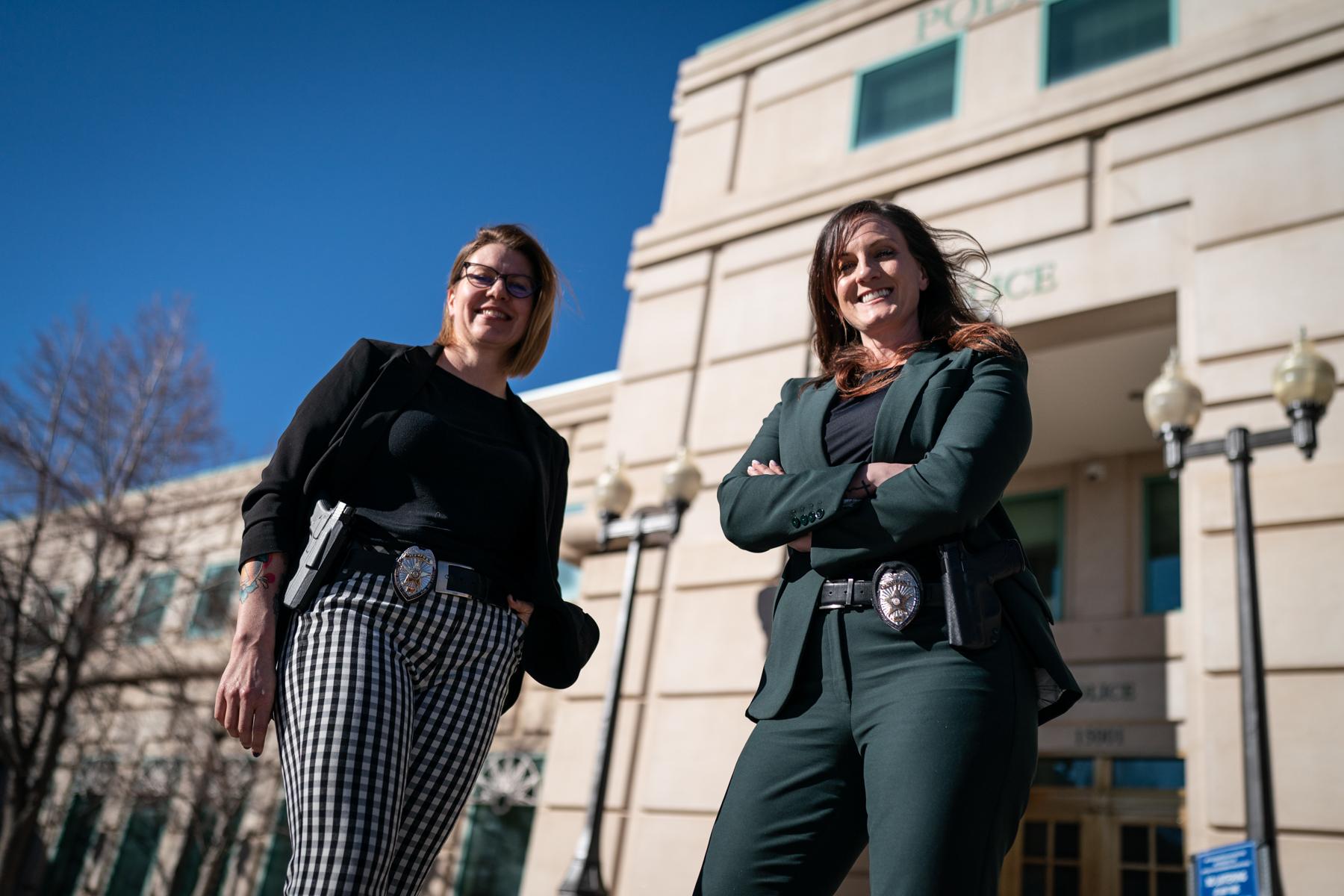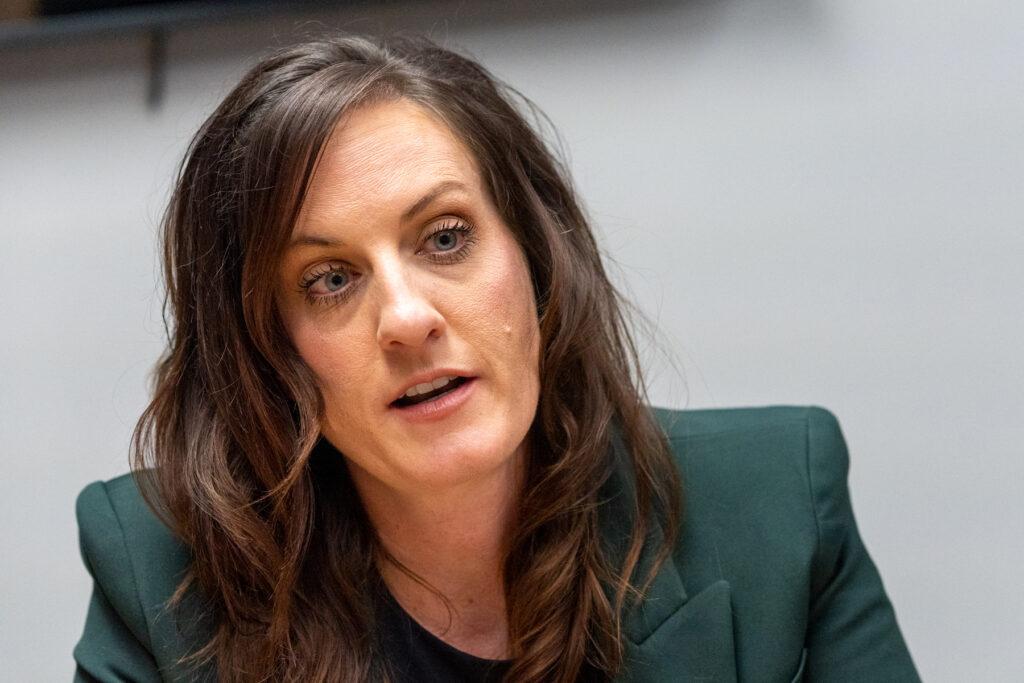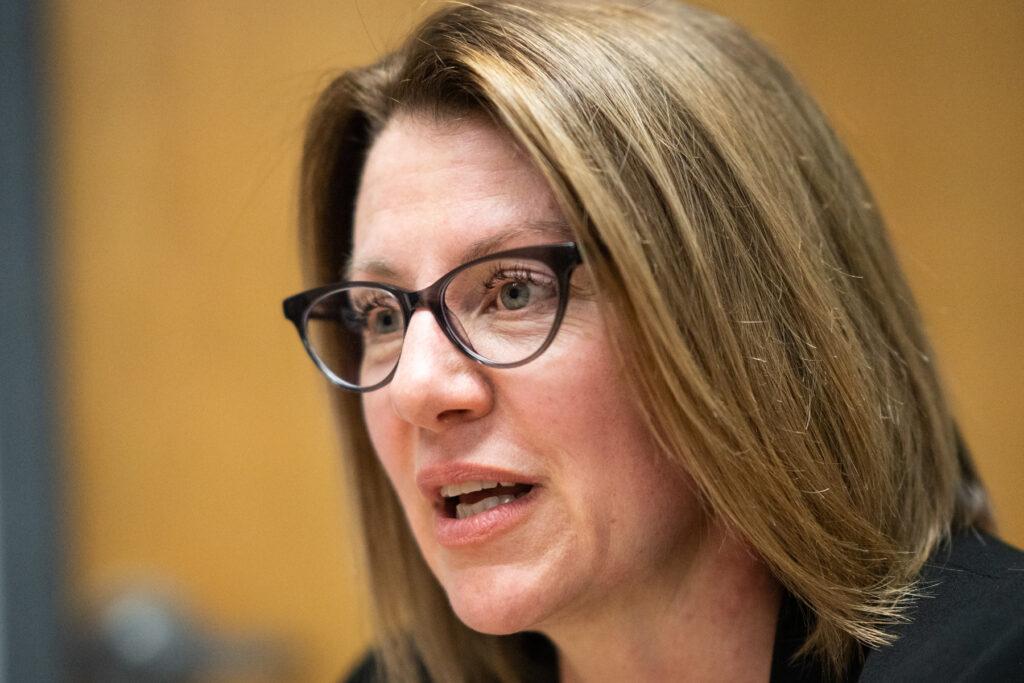
As law enforcement agencies across the state work to burnish their images after a handful of high-profile police killings and a subsequent wave of departures, many are leaning into trying to find one underrepresented demographic they hope can help create a different culture: women.
Women officers use less force, make fewer arrests, fire their guns less often, go hands-on less often with suspects and generally have been shown to communicate better than male officers, studies have shown.
Plus, as any law enforcement officer would say, modern policing is more often about crisis solutions, effective communication and calm problem-solving than using brute strength or pulling out a weapon — or at least it should be.
“It’s quick decision-making, multitasking, putting things together, figuring out a dynamic situation,” said Sgt. Machelle Williby at the Aurora Police Department. “And there’s just a huge emphasis on communication. And, in my experience, a lot of the female officers communicate better with the person we were contacting in a more efficient manner. We women talk more. It’s easier for us.”
Jefferson County Sheriff Reggie Marinelli, the first elected woman sheriff in the county, agreed.
When she worked with gang members in the 1990s at the same agency she now leads, her colleagues, all men, would usually send her to deal with the suspects because she said she always had great success calming the situation down.
Her secret? She’d start talking.
“I’d say, we’re going to handcuff you, and I would joke around with them,” said Marinelli, who was elected sheriff last year. “I would be able to get them handcuffed, and we’d just sit and chat, and I’d tell them what we were doing … You just keep talking and everything mellows out.”
Tough to recruit new law enforcement officials
Agencies across Colorado are struggling to hire really anyone at the moment.
They are holding job fairs at malls, doling out retention and signing bonuses and increasing salaries in law enforcement jobs in wake of massive retirements that came after the COVID-19 pandemic and amid state and national police reforms.
Last summer, the Public Safety Colorado coalition, which includes the state’s county sheriffs, police chiefs and the Colorado Fraternal Order of Police, estimated there was a 15 to 20 percent vacancy rate in agencies across the state.
“We are in a hiring crisis across the country and I just think it’s irresponsible for police leaders not to try and recruit women,” said Boulder Police Chief Maris Herold. In Boulder, women compose 20 percent of the police force and 16 percent of leadership — the highest in Colorado. “As a police leader, I think it’s just a very under-tapped group of people who think differently about policing.”
The hiring problem has been particularly acute in Aurora, which is amid a consent decree, and the agency has been without a permanent chief for almost a year. In 2022, they only hired 35 new people and reinstated 13 officers who had retired or left before. That’s out of 75 departures with roughly 50 openings right now.
Williby has weathered all of this, and now she’s trying to be an ambassador to get the word out that women are welcome at APD — and particularly have a track toward leadership. APD recently joined the national 30x30 Initiative, a pledge to have women make up 30 percent of their workforce including leadership ranks by 2030.
Women only compose about 11 percent of APD’s force now, or 75 women out of 692 sworn officers total.
“In Aurora, I’m going to go ahead and say it, unlike some agencies, we have opportunities for women here,” Williby said. “I have enough ambition. If I wanted to pursue something else, I would, I wouldn't still stay here if I didn't have opportunity.”
That includes jobs in SWAT and narcotics and arrest control instruction and any other specialized tactical units, places where women officers barely register in some agencies.

Colorado women in policing
In El Paso County, only three women are in special tactical teams, even though they compose about one-fifth of the sworn sheriff’s deputies. In Denver, out of more than 1,400 sworn officers, only 27 women have ranks of sergeant or above. And at the Grand Junction Police Department, out of 107 officers, there are two women in leadership.
Maureen McGough, a co-founder of the 30x30 Initiative which is based out of the Policing Project at New York University’s School of Law, said the push to hire more women police officers comes at a time when policing across the country is amid reforms anyway -- and those reforms tend to play to women’s strengths.
“Women have better outcomes with crime victims. Communities perceive women to be more trustworthy. They’re named in community complaints and lawsuits less often … they fire their service weapon less, it’s a growing list,” McGough said. “If there was a training out there that offered these outcomes, everyone would offer that training.”
McGough has encouraged the more than 200 agencies that have joined the initiative, including 10 in Colorado, to look at varying hiring pools for applicants. She said empathy and personal communications skills are strong in psychology, nursing, social work and even marketing jobs — fields with a lot more women than policing.
“You may see a different person coming through the door,” she said.
These days, policing is a lot different than it was 50 or 60 years ago. Officers are now often called to help solve problems that have nothing to do with crime. The profession is more service-oriented and crisis-mitigation-heavy. And communication is extremely important, McGough said.
“We know how officers spend their time, and they spend their time talking to people,” she said.
Scheduling creates barriers for some women
Sheriff Marinelli agreed. Just last week, she said deputies were called to a street at 5:30 a.m. in Jefferson County that had lost a manhole cover and the county’s infrastructure teams that fix such problems don’t start their days until 8 a.m.
“That wasn’t taught at the academy,” Marinelli laughed. “But there was a massive hole in the road, and you have no choice but to figure it out.”
Women officers say the reasons law enforcement agencies struggle to find women, particularly women to rise through the ranks to leadership, boil down to sexism and the lack of flexible schedules for sergeants and higher ranks.
Boulder Police Commander Rachael Clark was the only female motorcycle officer in a multi-agency force at a training once just about 12 years ago.
“There was zero line for the bathroom,” she laughed. “It was 80 men and then me.”
Clark said she had no problems within her own shop. She had friends and mutual respect with the men at BPD — but at the training exercises, officers from other departments asked her colleagues, “who is she doing to get that job?”
“It was still that perception,” she said. “And that was back in 2010. And obviously everybody on my unit was super supportive. They're like, ‘no, she can actually ride! She knows what she’s doing.’ ”
Clark also said that traditionally getting promoted in law enforcement agencies means having to go back down again, to a graveyard shift or weekends, but at a higher rank. She said if women have a family, that downshift can be hard.
“I was promoted to a sergeant out of the traffic unit but I went back to nights for two years. And then I got promoted to commander out of there and I had to go back to nights again as a commander,” she said, noting she only accepted these promotions after her kids were older. “Quite frankly, raising three kids and having this job, I mean, being promoted was not even an option for me, just based on family commitments until much later in my career. That was a huge component of it.”

30x30 Initiative
The Boulder Police Department has also signed on to the 30x30 Initiative. Herold, who has been in policing since 1993, said the characteristics of what makes a good officer often come to women naturally: empathy, good listening skills, a compulsion to avoid escalation.
“If you’re a guy, a white man, it doesn’t matter, it’s really understanding the code of conduct on the street and trying not to disrespect people at their worst times. I find that women naturally do that,” she said. “It’s treating people with respect and kindness … and women bring that to the table naturally, and I find that men who do the same thing don’t have complaints. It’s kind of something you need to look for in recruiting.”
A 2021 study within the Chicago Police Department found that women officers of all races made 7 percent fewer arrests than their officers who are men and used force 28 percent less often.
Sgt. Faith Goodrich at the Aurora Police Department said that could be because women often know they aren’t the strongest person in the room at any scene.
“There is no choice what circumstances you go to,” Goodrich said. “But I’m realistic that I’m not going to be the strongest person in the room most of the time, so just using brute force is not always going to be a winner for me. So I try to use other problem-solving techniques.”
Goodrich and others say they want to be role models for other women coming up through the ranks, or even those who haven’t yet decided to apply yet so they can give back.
Sheriff Marinelli has only been at the helm for about five weeks, but she’s already noticed that in leadership meetings, she sits in rooms surrounded by men.
“I am the sheriff and the next ranking female is a sergeant,” she said. “There are no other females between us … I do believe in powering those people where we’re not looking at the racial or gender but we’re looking for the best person for the job. We will be very transparent moving forward and I think you’ll see some change where we have females at every rank.”









